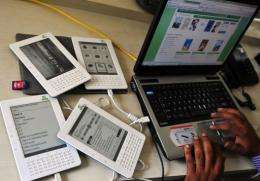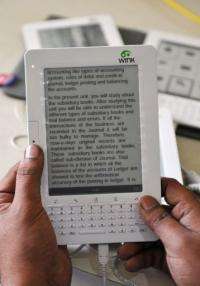Indian tech firms link with China to take on Western brands

Indian technology companies are growing in confidence. New brands are launching thick and fast, determined to take on established Western names with help from cheap Chinese factories.
Many of them have made significant inroads into the rocketing mobile phone market in India, and others already have their eye on bigger prizes in the international tablet computer and PC industry.
The boss of Bangalore-based Notion Ink, Rohan Shravan, is a man in a hurry. The fast-talking 25-year-old co-founded the group three years ago and will start taking orders for his "Adam" tablet computer within weeks.
Shipping of the sleek iPad wannabee to the United States and Europe could begin at the end of the year, with domestic sales starting soon after.
"What we want to do is set a standard in the international market with the Adam," Shravan, a graduate of one of India's prestigious technical universities, told AFP.
"There's going to be exponential growth for us," he said, adding that an updated version of the device was already in development.
Elsewhere, electronics group Olive and online Indian shopping site Infibeam -- which models itself on US-based Amazon, even down to its very similar logo -- have both launched their own tablet computers.
Amazon has other admirers in India and the concept of its top-selling e-reader Kindle, designed specifically for reading books and magazines, has also been copied by another ambitious Bangalore-based company, EC Media.
In August, it launched Wink, which is about 40 dollars cheaper than the Kindle in India, though it has received mixed reviews.
EC Media has signed up deals with local publishers to supply books in English as well as 15 vernacular languages -- a key part of their sales strategy.
"We thought that even though the market is not there yet, if you are in the market then it has good scope for growth," Pradeep Palazhi, chief operating officer, told AFP at a launch event in New Delhi.
"Wink is designed for the Indian reader. The Kindle is available here, but it's still dependent on the US store," he said.
In the mobile phone sector, competition is fierce and the impact of Indian companies could presage developments in other parts of the electronics market, where demand is being driven by India's rapidly expanding economy.
Rising incomes, access to credit, and the falling costs of technology mean sales of electronic goods are booming across the country.
In the mobile sector, Indian brands Micromax, Lava, Spice, Karbonn and Zen have mushroomed over the last 12 months, grabbing share from Nokia through aggressive marketing and products adapted for the local market.
In a study published in September, research firm IDC estimated domestic handset makers had grabbed a market share of 33 percent from just 0.9 percent two years ago.
Their road to success, like everyone else's in the electronics sector, reaches back into China where large-scale, hi-tech and cheap contract manufacturers have been tapped as suppliers.
Though relations between the two Asian superpowers are prickly at a diplomatic level, collaboration between India's skilled software engineers and device designers and China's factories is developing at pace.

"There are vendors in China that can do just about anything you want," said Amit Aggerwal, respected Indian technology writer and chief of the Digital Inspiration blog.
"You give them the price they are asking for and you get a product ready to go to stores.
"If you have an idea, getting it executed is quite easy now, so that's helping a lot of vendors," he added.
Shravan from Notion Ink said getting his devices manufactured in India made no sense because production capacity is small, meaning prices are high, and factories lack the latest hi-tech equipment.
"China is the one that has invested in nano technology. They have the scale," he told AFP.
He says he would like to see his devices being assembled in India -- mobile phone firms such as Micromax and Nokia already have such facilities -- but manufacturing will not be a possibility for the "next five to ten years".
"It takes a lot for the investment in the infrastructure in electronics," he said.
Consultancy Frost & Sullivan recently carried out a study of the Indian electronics market and concluded that the country had good prospects for manufacturing in several product areas.
Mobile handsets and mobile phone base stations have potential, as well as computer desktops and laptops, memory products and screens for televisions and computer monitors, Frost said.
Ameya Dalvi, editor of consumer electronics website www.techtree.com, says many in the industry expect a tablet PC boom after the success of the Apple iPad, which could present Indian companies with an opportunity.
He says the mobile phone market has shown how Indian brands are capable of challenging international groups in the low-end mass market once demand has been established.
"Indian companies are not pioneers. They'll wait, watch and then jump in at the right time if the market is sizeable," he says.
(c) 2010 AFP

















